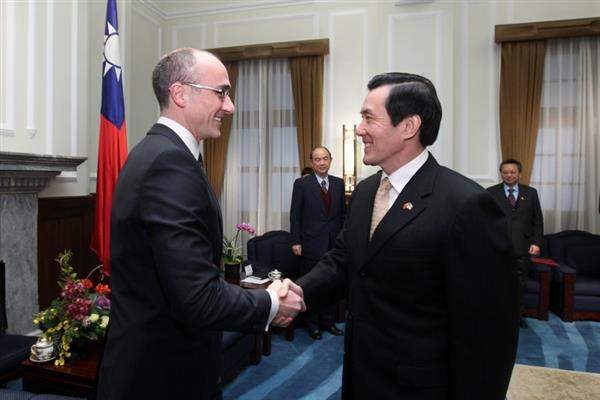News & activities
 News releases
News releases
President Ma Ying-jeou met on the morning of January 17 with American Enterprise Institute for Public Policy Research (AEI) President Arthur C. Brooks, with whom he exchanged opinions on a broad range of topics related to Taiwan-US relations and cross-strait developments.
President Ma remarked that as a friend to the ROC, the AEI has long paid close attention to Taiwan's development and provided assistance, adding that shortly after Dr. Brooks' visit to Taiwan last year the US government agreed to a second sale of arms to Taiwan. This year is the ROC's centenary and the United States has played an important role in the ROC's history over this period, and the president expressed his hope that the two sides will continue to cooperate in the future, creating a situation beneficial for both.
In addressing Taiwan's economic performance in 2010, the president said that economic growth last year is expected to have hit 9.98% and foreign trade reached US$526 billion, which was a record high. Meanwhile, the unemployment rate in November fell to 4.73%. Taiwan has scored well in many international rankings, and the president said he is even more optimistic for this year.
Turning to foreign relations, the president noted that the cross-strait Economic Cooperation Framework Agreement took effect on January 1 of this year, paving the way for the reduction of tariffs on various products. Further negotiations between the two sides of the Taiwan Strait will be held this year on trade in goods and services, investment guarantees, and dispute resolution. The cross-strait relationship continues to grow in an atmosphere of stability, he said, reiterating the ROC's support for the stance taken by the United States, Japan, and South Korea with regard to tension on the Korean Peninsula. The ROC has issued a statement condemning North Korean provocation. Cross-strait peace and stability, by contrast, will become the cornerstone of security in East Asia.
President Ma reported that Taiwan was formally included in the Schengen visa waiver program on January 11 of this year, which brings to 97 the number of nations and areas that ROC nationals can travel to visa-free. At present, roughly 400,000 Taiwanese visit the United States each year and 310,000 travel to Europe. The United States is one of the most important countries requiring ROC nationals to apply for visas. He expressed his hope that given the low visa application rejection rate and a new measure requiring that passport applicants file their applications in person, the ROC hopes to be included as soon as possible in the US Visa Waiver Program.
President Ma stressed that the ROC is closely monitoring mainland China leader Hu Jintao's upcoming visit to the United States, and expressed his hope that the United States will agree to sell F16 C/D series fighter jets to Taiwan. The objective of purchasing weapons and other military machinery is not to increase our armaments, but to modernize them, and boost Taiwan's ability to defend itself, the president explained.
Dr. Brooks was accompanied to the Presidential Office in the morning by Deputy Foreign Minister Lyushun Shen to meet President Ma. Also attending the meeting was National Security Council Secretary-General Hu Wei-jen.



